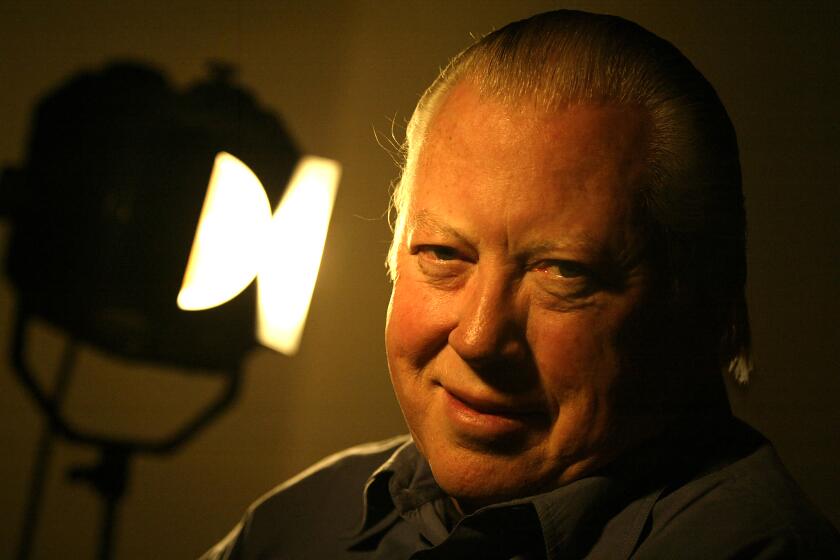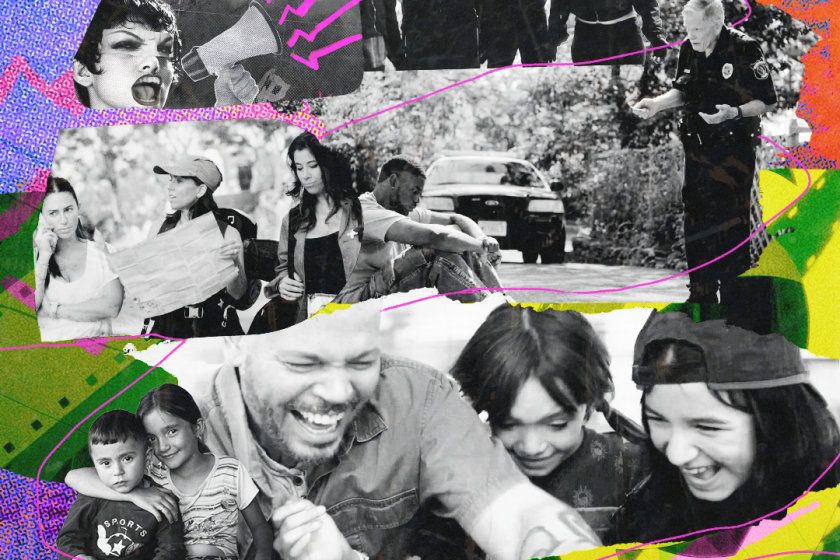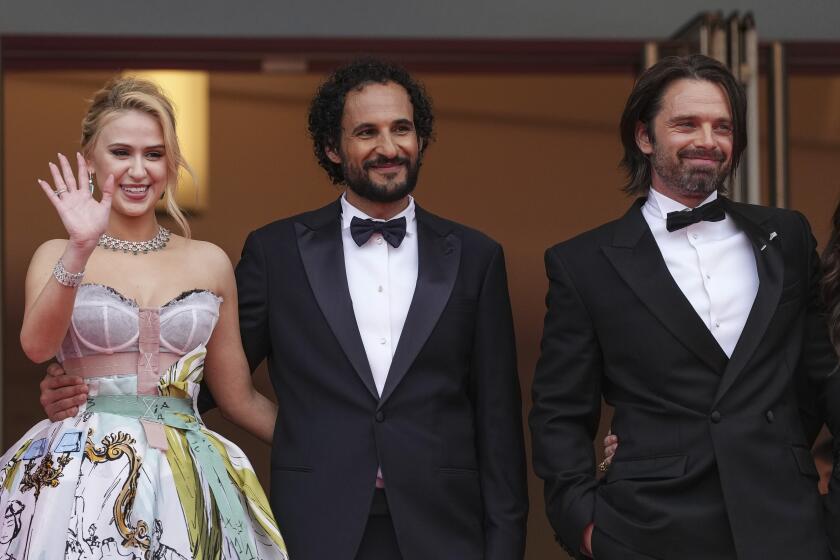Life Just Happens; Films Take a Little More Effort
The sister screenwriting team of Jill and Karen Sprecher put their hearts, souls, experiences and much of their life savings into their new film, “13 Conversations About One Thing”--a movie whose genesis was a devastating event in Jill’s life.
One character in the film, which opened Friday, suffers a severe brain injury after she’s the victim of a hit-and-run auto accident. Jill Sprecher nearly died from the same type of head injuries in 1985 when a man threw a bottle at her head at point-blank range one afternoon while she was on an errand.
“I was mugged twice actually within a three-month period in New York,” relates the Wisconsin native in her still distinctive accent. “The second time--I’m calling it a mugging because I don’t know what else to call it--a guy just hurled a bottle at my head. He wasn’t after my money or anything. He was one of those violent people in New York.”
After working for little or no money in production jobs in New York, Jill Sprecher finally had landed a decent gig as a production coordinator on a movie. Afraid she would lose her job, she returned to work after the incident. Because she was bleeding and in shock, everyone in the office suggested she go to the hospital. If Sprecher hadn’t taken their advice, she would have died.
“I went to the hospital and never came back to the job,” she says. “When the guy hit my head, it was like a missile launched at my head. I wasn’t bleeding that much on the outside, but on the inside, I had a blood clot. It was a little like ‘The Wizard of Oz.’ I checked myself in and then I don’t remember anything. I woke up a day and a half later and my mom was sitting in my room.”
Psychologically, Sprecher thought she bounced back rather quickly, but then a few months after the incident, depression set in. “Then this guy walked through the subway car and slapped me right here on the head and kept going,” she says. “It wasn’t like it hurt, but it hurt me psychologically. I was just sitting there in the subway car and all of a sudden tears stared coming down, but one man sitting across from me saw me and smiled at me.
“It was great because at the time I was thinking people are so cold and then I saw that smile. I can honestly say that had a huge effect on me and from that day on I think my life got a bit better.”
Sprecher and her sister re-create that scene of hope in the movie--in fact, they wrote that scene first and then plotted out the rest of the film, which interweaves multiple stories focusing on the life-changing impact people can have on each other.
In the film, Clea DuVall plays a cleaning woman who is the hit-and-run victim struggling to recover from her injuries; Alan Arkin is a dissatisfied salesman who seeks revenge on his relentlessly happy co-worker; Matthew McConaughey is an obnoxious young attorney whose life falls part because of a single act of recklessness; John Turturro is a middle-aged college professor who decides to change his unhappy life; and Amy Irving plays a sad woman who is forced to confront her husband’s infidelity.
Sprecher says the easiest thing about getting the movie made was writing the script. “The first story we came up with was the happy guy and the Alan Arkin story,” she says. “And then we came up with complementary stories on the same theme and we plotted them out on note cards. We had different color cards for each story and we looked for a place in each story that would sort of be a natural ending where we could jump to another character. Sometimes it’s easier to see the big picture if you put them on these little cards.”
Karen Sprecher admits that the two waited until the last minute to actually write the script. “We’re not very structured,” she says.
There also doesn’t seem to be any sibling rivalry between the two (the sisters decline to give their exact ages; Karen is in her early 30s, and Jill is eight years older). Not only do they live together in their older brother’s house in Los Angeles, they also “hang out” a lot together. “We’re almost the same person,” says Karen Sprecher.
The sisters first collaborated to write the independent comedy “Clockwatchers,” which Jill Sprecher also directed. “Clockwatchers,” which premiered at the 1997 Sundance Film Festival, was a modestly received comedy about a group of temp workers who toil at a faceless, heartless credit company.
In the audience at Sundance was R.E.M. lead singer Michael Stipe, who moonlights as a film producer.
The sisters knew that he enjoyed “Clockwatchers,” so after they finished the script to “13 Conversations,” they sent it to him. Stipe and his business partner Sandy Stern signed on as executive producers. Stipe also got the script to McConaughey and DuVall.
. . “I was so honored that she chose me to play something so personal for her,” says DuVall (“Girl, Interrupted”). “That just made it more meaningful.”
The Sprechers also called their friend actor-writer-director Bob Balaban (“Gosford Park”) for help. “We knew he knew Alan Arkin and we said would you mind calling Alan and telling him we’re not crazy,” says Jill Sprecher. “13 Conversations “ was shot in New York City in just 32 days.
“I wanted to shoot it all on location and not build sets on a stage,” says Jill Sprecher. “That complicates matters because you have to set up lights at each location, take them down, pack them up and then move them to another location. We would have to move once a day. Our cinematographer Dick Pope (“Naked,” “Topsy-Turvy”) said I think maybe we can do this in 40 days. I said how about 35 days? . As we were shooting, our financing never jelled so we had to cut our budget by one-third [from $4.5 million to $3 million]. It was very stressful.”
So was scheduling the troupe of actors who were simultaneously working on other projects. “Clea left in the middle to shoot a movie in Montana,” says Jill Sprecher. “Matthew went to Texas and then came back. Everyone had these specific dates. When our money didn’t show up, I think the original company that was set to produce it wanted us to push the start date back and we ran up against that if we didn’t start the next day we were doing to lose John Turturro. We ended up just deciding to go for it. You don’t even want the train to stop.”
The sisters are in deep debt because of the financial problems on “13 Conversations.” “We used our credit cards a lot to keep it going,” says Jill Sprecher. “We will not be reimbursed for it. The movie did sell to Sony Classics, but we gave up our interest in the film” in order to keep the production going.
Currently, the sisters have a better-paying gig---they are writing a drama pilot for a series they pitched to HBO. “We had never gotten a writing job before,” says Karen Sprecher.
More to Read
Only good movies
Get the Indie Focus newsletter, Mark Olsen's weekly guide to the world of cinema.
You may occasionally receive promotional content from the Los Angeles Times.







